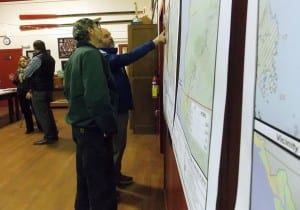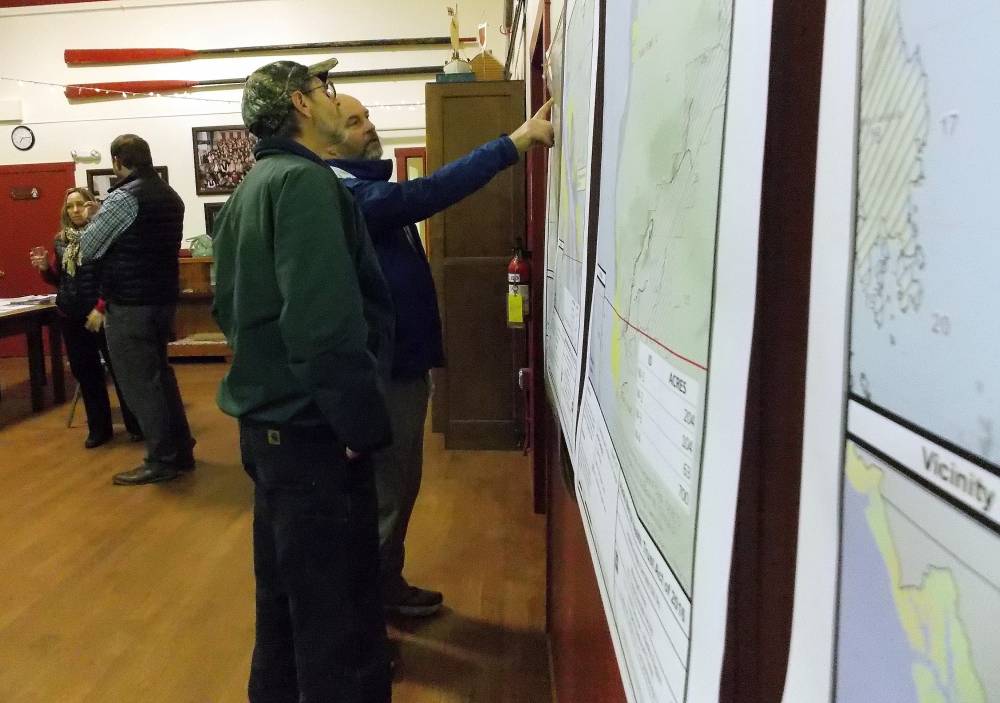
Petersburg resident, Jeff Meucci, points to a lands map while Ed Wood looks on. Photo/Angela Denning
The Alaska Mental Health Trust Land Office is optimistic about a land exchange they’ve been working on for over a decade which would prevent possible logging near Petersburg and other areas. That was the message Trust staff shared during an informational meeting in Petersburg last week. KFSK’s Angela Denning reports:
The possibility of the Mental Health Trust Land Office logging land it owns near Petersburg has been an ongoing issue. Timber harvest is one of the ways that the state corporation makes money to serve Alaskans with mental health needs.
At the public meeting representatives with the Trust said they didn’t want to log near Petersburg and have been seeking a land exchange with the U.S. Forest Service for over ten years.
John Morrison is the Executive Director of the Trust’s Land Office. He says the Trust is waiting on Congress to approve legislation which would give them land on Prince of Wales Island and other areas which they could then log.
“We are hearing from several sources that it is a likely occurrence,” Morrison said.
Morrison says if for some reason the bill doesn’t pass by mid-January, the Trust’s board would decide whether or not to pursue a timber sale. The timber sales could include selective logging by helicopter.
“We could either not sell the timber or we could enter into any number of other transactions that deemed to be in the best in interest of the Trust,” Morrison said.
And he says there would be a lengthy public process.
Paul Slenkamp, the main forester at the Trust Land Office, agrees that the land exchange process is frustrating.
“Spend 10 years on a project that we’re not sure whether it will be completed or not. Yes, it tries one’s patience,” Slenkamp said.
He says although the process isn’t easy, timber sales are important to the Trust.
“Timber has been a time proven generator of revenue from these things and it is a renewable resource so therefore with the trust being in perpetuity we will be able to harvest these lands again in 50 or 60 years,” Slenkamp said.
Timber sales have historically been one of the Trust’s main sources of revenue. Since the timber program started in 1994, it has brought in over $43 million. But logging isn’t a big profit maker these days. There’s a lot of controversy surrounding it and the federal government is moving away from harvesting old growth. These days, the Trust makes about $700,000 a year on timber.
During the meeting, attendees saw a video of a woman who is receiving mental health services through the Trust.
Katie Baldwin is a Senior Program Officer at the Mental Health Trust Authority or what she calls the program side of the Trust.
“We need to have access to treatment and services as close to our communities as possible,” Baldwin said. “Our primary mission is to make sure there is comprehensive mental health integrated system of care in Alaska to serve our trust beneficiaries. That’s what the trust is all about.”
Trust beneficiaries include people with mental illness, substance abuse disorders, addictions, traumatic brain injury, Alzheimer’s and dementia.
But logging as a way to pay for those services is controversial. At the public meeting, several Petersburg residents spoke against timber sales. Some, who own homes on forested slopes near Trust land, fear landslides. They say they’ve had five in the area in the last decade.
Some of their comments:
“I’m really concerned if they start disturbing the soil up above our house and the side of the hill comes down.”
“It’s a hazard and no one can predict when these slides happen.”
“What I’m curious about is if you do log above my house and it causes a landslide do you have a program to reimburse me?”
Another resident, Becky Knight, spoke against local logging and the land exchange which would mean logging elsewhere. She says the Trust is asking the public to make a Sophie’s Choice or choose between two bad options.
“It’s really hard for me knowing what’s going to happen to this land, to support this legislation,” Knight said. “I’m also caught between a rock and a hard place.”
Slenkamp reiterated that the Land Office’s priority is to pass the land exchange.
“I have not started to design a timber sale for Petersburg. I hope to not have to design a timber sale for Petersburg,” Slenkamp said. “I’m very aware of the landslide issues and the safety issues. It is not our intent to place anyone in danger.”
He says not all lands they own near Petersburg are at risk of landslides. He says the Trust also needs to support a working timber industry in Southeast because it makes their lands worth more.
“If there’s no industry and no market of significance for those assets, we’ve lost value,” he said.
A few residents spoke in favor of logging because it would create jobs. They said selective harvests by helicopter would not produce landslides.
Land Office staff made it clear that they are mandated to raise revenue as the money making arm of the Mental Health Trust Authority.
Wyn Menefree is the Land Office’s Deputy Director.
“We’re trying to maximize the revenue to the Trust and it’s not just for the moment but for duration because it’s an endowment. It’s forever,” Wenefree said.
Besides land leases and sales, the Land Trust office also makes money through real estate, mineral and energy exploration and development, and material sales.
The land office also held meetings in Ketchikan and Saxman about possible logging plans on Deer Mt.
The Mental Health Trust Authority Board is meeting November 17 in Anchorage to reconsider its decision on potential logging. At the Petersburg meeting, Trust staff encouraged residents to send their written comments to the board and make verbal testimony by teleconference at the meeting.










